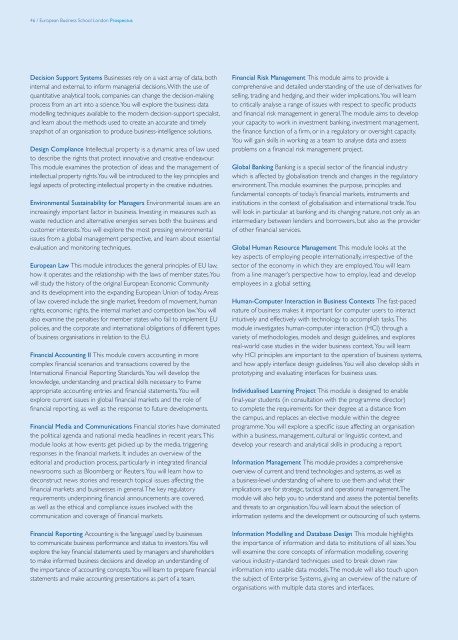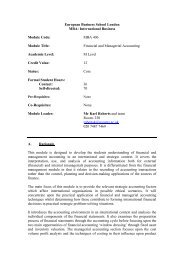Download prospectus (as PDF) - The European Business School ...
Download prospectus (as PDF) - The European Business School ...
Download prospectus (as PDF) - The European Business School ...
You also want an ePaper? Increase the reach of your titles
YUMPU automatically turns print PDFs into web optimized ePapers that Google loves.
46 / <strong>European</strong> <strong>Business</strong> <strong>School</strong> London Prospectus<br />
Decision Support Systems <strong>Business</strong>es rely on a v<strong>as</strong>t array of data, both<br />
internal and external, to inform managerial decisions.With the use of<br />
quantitative analytical tools, companies can change the decision-making<br />
process from an art into a science.You will explore the business data<br />
modelling techniques available to the modern decision-support specialist,<br />
and learn about the methods used to create an accurate and timely<br />
snapshot of an organisation to produce business-intelligence solutions.<br />
Design Compliance Intellectual property is a dynamic area of law used<br />
to describe the rights that protect innovative and creative endeavour.<br />
This module examines the protection of ide<strong>as</strong> and the management of<br />
intellectual property rights.You will be introduced to the key principles and<br />
legal <strong>as</strong>pects of protecting intellectual property in the creative industries.<br />
Environmental Sustainability for Managers Environmental issues are an<br />
incre<strong>as</strong>ingly important factor in business. Investing in me<strong>as</strong>ures such <strong>as</strong><br />
w<strong>as</strong>te reduction and alternative energies serves both the business and<br />
customer interests.You will explore the most pressing environmental<br />
issues from a global management perspective, and learn about essential<br />
evaluation and monitoring techniques.<br />
<strong>European</strong> Law This module introduces the general principles of EU law,<br />
how it operates and the relationship with the laws of member states.You<br />
will study the history of the original <strong>European</strong> Economic Community<br />
and its development into the expanding <strong>European</strong> Union of today.Are<strong>as</strong><br />
of law covered include the single market, freedom of movement, human<br />
rights, economic rights, the internal market and competition law.You will<br />
also examine the penalties for member states who fail to implement EU<br />
policies, and the corporate and international obligations of different types<br />
of business organisations in relation to the EU.<br />
Financial Accounting II This module covers accounting in more<br />
complex financial scenarios and transactions covered by the<br />
International Financial Reporting Standards.You will develop the<br />
knowledge, understanding and practical skills necessary to frame<br />
appropriate accounting entries and financial statements.You will<br />
explore current issues in global financial markets and the role of<br />
financial reporting, <strong>as</strong> well <strong>as</strong> the response to future developments.<br />
Financial Media and Communications Financial stories have dominated<br />
the political agenda and national media headlines in recent years.This<br />
module looks at how events get picked up by the media, triggering<br />
responses in the financial markets. It includes an overview of the<br />
editorial and production process, particularly in integrated financial<br />
newsrooms such <strong>as</strong> Bloomberg or Reuters.You will learn how to<br />
deconstruct news stories and research topical issues affecting the<br />
financial markets and businesses in general.<strong>The</strong> key regulatory<br />
requirements underpinning financial announcements are covered,<br />
<strong>as</strong> well <strong>as</strong> the ethical and compliance issues involved with the<br />
communication and coverage of financial markets.<br />
Financial Reporting Accounting is the ‘language’ used by businesses<br />
to communicate business performance and status to investors.You will<br />
explore the key financial statements used by managers and shareholders<br />
to make informed business decisions and develop an understanding of<br />
the importance of accounting concepts.You will learn to prepare financial<br />
statements and make accounting presentations <strong>as</strong> part of a team.<br />
Financial Risk Management This module aims to provide a<br />
comprehensive and detailed understanding of the use of derivatives for<br />
selling, trading and hedging, and their wider implications.You will learn<br />
to critically analyse a range of issues with respect to specific products<br />
and financial risk management in general.<strong>The</strong> module aims to develop<br />
your capacity to work in investment banking, investment management,<br />
the finance function of a firm, or in a regulatory or oversight capacity.<br />
You will gain skills in working <strong>as</strong> a team to analyse data and <strong>as</strong>sess<br />
problems on a financial risk management project.<br />
Global Banking Banking is a special sector of the financial industry<br />
which is affected by globalisation trends and changes in the regulatory<br />
environment.This module examines the purpose, principles and<br />
fundamental concepts of today’s financial markets, instruments and<br />
institutions in the context of globalisation and international trade.You<br />
will look in particular at banking and its changing nature, not only <strong>as</strong> an<br />
intermediary between lenders and borrowers, but also <strong>as</strong> the provider<br />
of other financial services.<br />
Global Human Resource Management This module looks at the<br />
key <strong>as</strong>pects of employing people internationally, irrespective of the<br />
sector of the economy in which they are employed.You will learn<br />
from a line manager’s perspective how to employ, lead and develop<br />
employees in a global setting.<br />
Human-Computer Interaction in <strong>Business</strong> Contexts <strong>The</strong> f<strong>as</strong>t-paced<br />
nature of business makes it important for computer users to interact<br />
intuitively and effectively with technology to accomplish t<strong>as</strong>ks.This<br />
module investigates human-computer interaction (HCI) through a<br />
variety of methodologies, models and design guidelines, and explores<br />
real-world c<strong>as</strong>e studies in the wider business context.You will learn<br />
why HCI principles are important to the operation of business systems,<br />
and how apply interface design guidelines.You will also develop skills in<br />
prototyping and evaluating interfaces for business uses.<br />
Individualised Learning Project This module is designed to enable<br />
final-year students (in consultation with the programme director)<br />
to complete the requirements for their degree at a distance from<br />
the campus, and replaces an elective module within the degree<br />
programme.You will explore a specific issue affecting an organisation<br />
within a business, management, cultural or linguistic context, and<br />
develop your research and analytical skills in producing a report.<br />
Information Management This module provides a comprehensive<br />
overview of current and trend technologies and systems, <strong>as</strong> well <strong>as</strong><br />
a business-level understanding of where to use them and what their<br />
implications are for strategic, tactical and operational management.<strong>The</strong><br />
module will also help you to understand and <strong>as</strong>sess the potential benefits<br />
and threats to an organisation.You will learn about the selection of<br />
information systems and the development or outsourcing of such systems.<br />
Information Modelling and Datab<strong>as</strong>e Design This module highlights<br />
the importance of information and data to institutions of all sizes.You<br />
will examine the core concepts of information modelling, covering<br />
various industry-standard techniques used to break down raw<br />
information into usable data models.<strong>The</strong> module will also touch upon<br />
the subject of Enterprise Systems, giving an overview of the nature of<br />
organisations with multiple data stores and interfaces.





